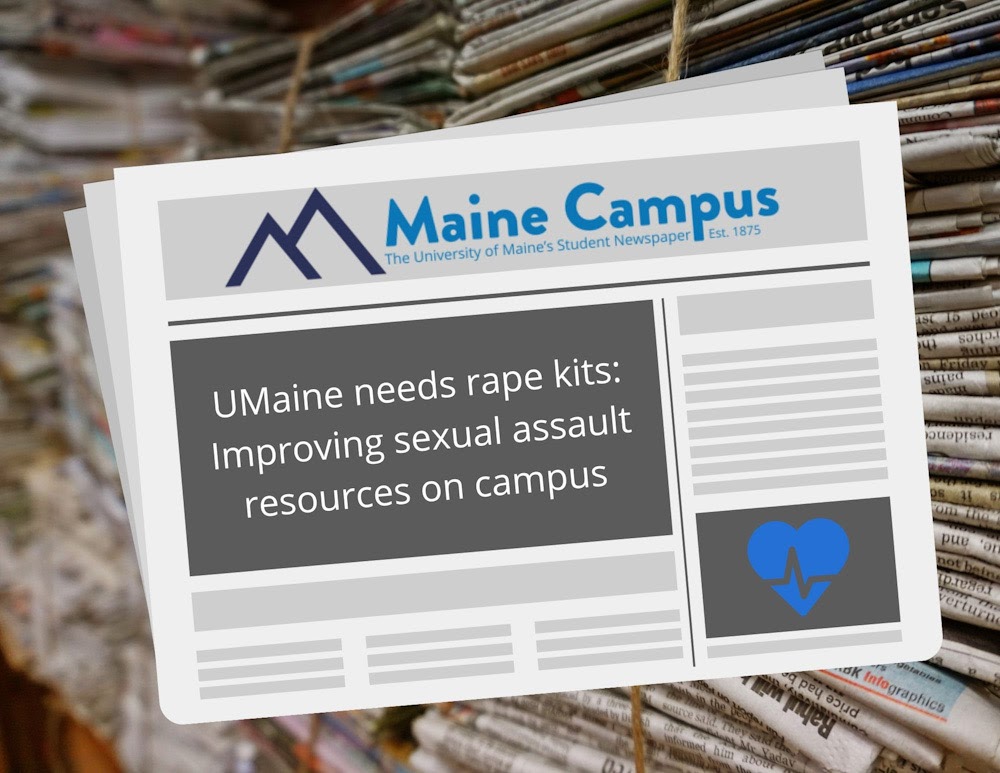1 in 4 undergraduate women are sexually assaulted in college. While perpetrators rarely serve prison time, victims are left with emotional and physical trauma. Only 20% of women aged 18-24 report sexual assault to law enforcement. As highlighted by the Association for American Universities, many women do not report cases because they do not think it’s serious enough, they feel ashamed or they think they can take care of it on their own. The unfortunate reality is that there is not a sufficient support system for sexual assault victims, and we need to streamline the process for helping victims seek immediate medical help on college campuses.
The University of Maine website provides some helpful information on their page “What to do if you have been sexually assaulted.” It emphasizes that “in the immediate aftermath of a sexual assault, the most important thing is for the victim to get to a safe place.” After this, “when a feeling of safety has been achieved, it is vital for the victim to receive medical attention, and strongly recommended for the victim to receive a forensic examination.” The site points out critical steps victims should take to preserve evidence such as not bathing, not changing clothes, not using the restroom and leaving the crime scene untouched.
The university could stand to increase campus resources for sexual assault victims. Students are advised to go to the hospitals in Bangor and wait in the ER for medical assistance. In the aftermath of sexual assault, many victims are discouraged by long ER wait times, which can interfere with the time sensitive process of evidence collection.
Sexual assault is often enabled through the use of date rape drugs, alcohol being the most common. Other common drugs include flunitrazepam (Rohypnol), gamma-hydroxybutyric acid (GHB), gamma-butyrolactone (GBL) and ketamine. These are powerful substances that can cause victims to become confused, lose muscle control, slur speech or pass out, facilitating a perpetrator in sexual assault. GHB, for example, takes effect as soon as ten minutes after ingestion and can impair the victim for up to seven hours.
Many of these drugs metabolize quickly within the body and only last a few hours after uptake. This leaves a very narrow time frame for victims to get tested. Drug tests are a first step in providing victims with clarity, as well as in recording critical evidence for prosecuting perpetrators should victims choose to do so.
A rape kit or Sexual Assault Evidence Kit (SAEK) carries intructions, materials, containers and envelopes for collecting samples during a sexual assault evaluation. There are no rape kits available at the Cutler Health Center on campus. There are trained medical professionals capable of performing forensic medical exams, such as nurses and physician assistants, but the service is not offered by the university. Additionally, there is no campus service to transport students to nearby hospitals to access essential resources not provided on-campus.
UMaine is not the only school to lack appropriate resources for sexual assault victims. Only four of the top 100 U.S. colleges provide sexual assault exams at their student health centers. Just because few universities actually offer these resources doesn’t mean they aren’t capable of doing so.
In California, Assembly member Cristina Garcia is introducing a bill requiring all University of California and California State University campuses to ensure access to free rape kit services within ten miles of campus or at their own U.C. health centers. The University of British Columbia faced backlash for its poor sexual assault response. Since then, it has initiated services providing rape kits on campus. As reported by Vice news, “The kits will now be available at UBC’s hospital from 8 a.m. to 10 p.m., seven days a week.” UMaine should follow suit in providing free test kits on campus to expedite the process and encourage victims to seek medical attention.
Ultimately, what matters most is protecting the physical and emotional health of victims after an incredibly traumatizing experience. There should be accessible services to provide victims the support, medical care and attention they need after sexual assault. There are currently no rape kits available on campus, no free transportation to hospitals and few resources for students regarding what steps to take directly after a sexual assault. Creating a system that enables, not discourages, women in the process of seeking justice will help make this a safer community.









